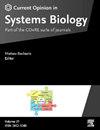Coupling between the cell cycle and the circadian clock: Lessons from computational modelling and consequences for cancer chronotherapy
IF 2.2
Q2 BIOCHEMISTRY & MOLECULAR BIOLOGY
引用次数: 0
Abstract
Chronotherapy aims at optimising the time of day and dosing of drugs administration. This is a promising perspective because the toxicity and efficacy of many drugs show a dependence on the time of the day at which they are administrated. Efficient cancer chronotherapy requires a good understanding of the interplay between the cell cycle and the circadian clock. Computational models offer a way to study the dynamics resulting from the coupling between these two biological oscillators and to predict successful therapeutic protocols. We review here recent advances and highlight key challenges for further developments of predictive mathematical models.
细胞周期与昼夜节律时钟之间的耦合:计算建模的启示及对癌症时间疗法的影响
时间疗法旨在优化每天的用药时间和剂量。这是一个很有前景的观点,因为许多药物的毒性和疗效都与一天中的用药时间有关。高效的癌症时间疗法需要充分了解细胞周期与昼夜节律时钟之间的相互作用。计算模型为研究这两种生物振荡器之间的耦合所产生的动态变化以及预测成功的治疗方案提供了一种方法。我们在此回顾了最近的研究进展,并强调了进一步开发预测性数学模型所面临的主要挑战。
本文章由计算机程序翻译,如有差异,请以英文原文为准。
求助全文
约1分钟内获得全文
求助全文
来源期刊

Current Opinion in Systems Biology
Mathematics-Applied Mathematics
CiteScore
7.10
自引率
2.70%
发文量
20
期刊介绍:
Current Opinion in Systems Biology is a new systematic review journal that aims to provide specialists with a unique and educational platform to keep up-to-date with the expanding volume of information published in the field of Systems Biology. It publishes polished, concise and timely systematic reviews and opinion articles. In addition to describing recent trends, the authors are encouraged to give their subjective opinion on the topics discussed. As this is such a broad discipline, we have determined themed sections each of which is reviewed once a year. The following areas will be covered by Current Opinion in Systems Biology: -Genomics and Epigenomics -Gene Regulation -Metabolic Networks -Cancer and Systemic Diseases -Mathematical Modelling -Big Data Acquisition and Analysis -Systems Pharmacology and Physiology -Synthetic Biology -Stem Cells, Development, and Differentiation -Systems Biology of Mold Organisms -Systems Immunology and Host-Pathogen Interaction -Systems Ecology and Evolution
 求助内容:
求助内容: 应助结果提醒方式:
应助结果提醒方式:


